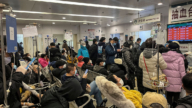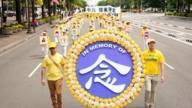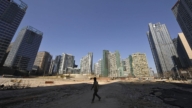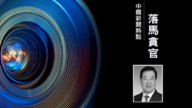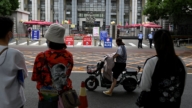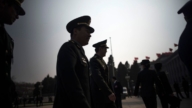【新唐人2011年9月16日讯】中共总理温家宝9月14号在大连出席达沃斯论坛时,再度高调呼吁政治体制改革,重提当年胡耀邦、赵紫阳时代的“党政分开”,明确要改变“以党代政”,他并提出政改五大要点,包括司法独立等等。海内外学者悲观的指出,目前温家宝所提出的政改只能是“空话”,但讲总比不讲要好。
温家宝14号两度提到政改,《新华网》作了报导。他先在上午的开幕式上致辞,提到推进经济和政治体制改革,“坚决破除体制机制障碍”。
下午温家宝与企业家座谈会上,世界经济论坛主席施瓦布(Klaus Schwab)说,温家宝上午的演讲是“一场重要的政治宣言”,并问怎样才能实现政改的目标?
温家宝接着提出了政改五大要点:第一、依法治国,改变“以党代政”,把权力绝对化和过分集中的现象,改革党和国家的领导制度;第二、推进社会公平正义;第三、维护司法公正独立;第四、保障人民的民主权利,最主要的是选举权、知情权、监督权和参与权;第五、反腐败。
中国社科院政治研究所首任所长严家祺:“温家宝只是讲一讲而已,就是给他以后不当总理了,留下一个比较好的名声。另外,他这些话本身是对的,他真要推动政治改革的话,也不是这么简单讲几句而已,要必须通过实际的步骤来推动中国的变化,但他讲比不讲要好。”
中国人民大学政治系教授张鸣对香港《明报》表示,温家宝是首次将政改提得如此深入,但他也认为只是一种“表态”,中共官场现在是“表态文化”,温家宝的策略就是“能说就说”。
温家宝提到,维护司法公正独立和社会公平正义,是早在30多年前十一届三中全会就提出来的。“党政分开”也是邓小平在30年以前就提出来的,他认为在今天尤为紧迫。
去年8月深圳特区成立30周年,温家宝也提出“党政分开”,这是1980年8月邓小平在中共中央政治局扩大会议上发表的《党和国家领导制度的改革》讲话中提到的。
严家祺:“1986年到1987年,当时赵紫阳是中央政治体制改革5人研讨小组的负责人,温家宝也参与了这个研讨小组的工作,而且温家宝的主要工作是领导研究‘党政分开’问题,所以温家宝对‘党政分开’问题应该说是非常熟悉。而且写到了十三大的赵紫阳的政治报告里面去。”
胡耀邦、赵紫阳主政时期着手改革“党政不分”,当时取消了一些部委的党组,但1989年六四事件之后,就全面回到了高度集权、以党代政,现在弊病越来越大。之后的十四大到十七大,“党政分开”再没有在报告中出现。
今年3月,中共人大委员长吴邦国高调重申“五不搞”,强调“一切法律法规都必须有利于加强和改善党的领导”。
著名宪政学者和维权人士张祖桦表示,温家宝意识到“以党代政”问题严重,党委在各个领域管得非常细,乃至可能管到互联网上某个人发的帖子,但根本制度不变,老说空话不能解决问题。
张祖桦80年代曾任团中央常委、中央国家机关团委总书记,是胡锦涛、李克强的前同事,他目前在北京被监视居住。
对于温家宝在座谈会上提出的基层选举和党内扩大民主,张祖桦批评中共打压基层人大参选人,以及现在很多做法,都是侵犯人权、违宪违法。
《北京之春》杂志主编胡平:“与此同时,中共当局在各地乱抓、乱判,很多维权人士、律师、异议人士被失踪,对维权人士、对自由信仰者、对法轮功、对民运人士的迫害比以前还更严厉,所以从这里可以看得出、也多少反映一些上层的内部矛盾。”
9月号香港《开放》杂志发表时政评论家陈破空的文章《新四人帮主宰中国政局》,内容指出,温家宝在中共高层陷于孤立,江泽民派系的四大官僚:吴邦国主管人大、李长春主管中宣部、周永康主管司法、贾庆林主管政协,这四人以左为荣,成为政治改革最大的绊脚石。
新唐人记者梁欣、李元翰、李若琳采访报导。
Wen’s Political Reform
On September 14th, Chinese Premier Wen Jiabao attended the Davos Forum in Dalian. and gave another high-profile appeal to the political system.
He repeated ‘separation of party and government’ in the era of Hu Yaobang and Zhao Ziyang, making it clear to change ‘the party on behalf of government’ situation.
He proposed five key points of political reform, including judicial independence. Scholars in China and abroad are pessimistic about Wen’s proposal, taking it as empty talk, but some feel that something is better than nothing.
Wen mentioned political reform twice, Xinhua reported. He gave a speech in the morning opening ceremony, where he mentioned promoting economic and political reform by “resolutely getting rid of structural and institutional obstacles."
In the afternoon, Wen went to an entrepreneur’s forum. The World Economic Forum President Klaus Schwab (Klaus Schwab) said Wen’s morning speech was ‘a major political declaration’, which put forth the question of how to achieve the goal of political reform.
Wen put forward political reform with five main points: First, the rule of law, change ‘the party on behalf of government’, change absolute power and excessive concentration of power, and reform the party and state leadership system; Second, promote social fairness and justice; Third, maintain judicial impartiality and independence; Fourth, safeguard the people’s democratic rights, most notably the right to vote, right to information, supervision and participation; Fifth, anti-corruption.
Yan Jiaqi (The 1st director of China Institute of Political Studies):
“Wen Jiabao simply talked about it, trying to leave himself a good reputation after his term of PM. His words were right. If he really wants to promote political reforms, it is not that simple to say a few words.
It has to go through practical steps to promote the changes in China.
But he spoke out, it’s better than speaking nothing. “
Professor Zhang Ming in the political science department of Renmin University of China, said to Ming Pao in Hong Kong, it was the first time that Wen mentioned political reform at such a depth. But he also believes it’s only a ‘statement’. Chinese officialdom is now ‘a statement culture.’ Wen’s strategy is to “speak out when possible."
Thirty years ago Wen said maintaining judicial independence,
social justice, and fairness had already been proposed in the Third Plenary Session of the 11th Central Committee of the Chinese Communist Party (CCP). “Separation of party and government" was also proposed 30 years ago by Deng Xiaoping. Wen found it particularly urgent today.
Shenzhen Special Economic Zone had its 30th anniversary in August 2010, when Wen also put forward the ‘separation of party and government’, which was also mentioned by Deng Xiaoping in the enlarged meeting of the Political Bureau of CCP Central Committee.
Yan Jiaqi: “From 1986 to 1987, when Zhao Ziyang was a leader of the central discussion of political reform, where Wen also got involved in the discussions.
Wen’s focus was on ‘separation of party and government’,
so he is very familiar with this issue. His research had also been included in Zhao’s political report to the Thirteenth National Party Congress.
Hu Yaobang and Zhao Ziyang started the political reform, eliminating party organizations in some ministries. After the June 4, 1989 Massacre, the CCP went back to a highly centralized form, and the party spoke on behalf of the government, which displayed more and more problems. After the 14th congress to 17th congress, ‘separation of party and government’ no longer appeared in the report.
In March 2011, Chairman of Chinese National People’s Congress Wu Bangguo reiterated the ‘Five Don’ts’ and stressed that “all laws and regulations must be conducive to strengthening and improving CCP’s leadership."
Zhang Zuhua, a well-known constitutional scholar and activist said Wen was aware of the serious problem caused by ‘the party on behalf of the government.’
CCP’s management committees in all areas were very detailed,
they even monitored individuals’ posts online.
When CCP’s system remains unchanged, the talk can not solve the problem.
Zhang Zuhua was a member of Central Committee of the CCP, General Secretary of Communist Youth League in central state organs in the 1980s.
He was a colleague of Hu Jintao and Li Keqiang. Zhang is currently living in Beijing under monitoring.
Wen had put forward the primary election and expanding democracy within the party.
Zhang Zuhua criticized the CCP to suppress
grassroots people’s congress election. He said many practices now are violating human rights and constitutional law.
Hu Ping (Beijing Spring magazine editor- in- chief): “At the same time, the Chinese authorities arrested and sentenced people at their will. Many activists, lawyers, and dissidents are missing. Persecution is more serious for human rights defenders, religions, Falun Gong, and democracy activists. These show internal contradictions at high levels of the CCP."
In September, critic Chen Pokong published an article in Open Magazine, ‘New Gang of Four to Dominate Politics in China’. He points out that Wen was isolated in the high level CCP, leftist officials in Jiang Zemin’s Group are the major block to political reform. This includes Wu Bangguo controlling the People’s Congress, Li Changchun in charge of the Promotion Department, Zhou Yongkang, head of the Judiciary, and Jia Qinglin, director of the CPPCC
NTD reporters Liang Xin, Li Yuanhan and Li Ruilin



